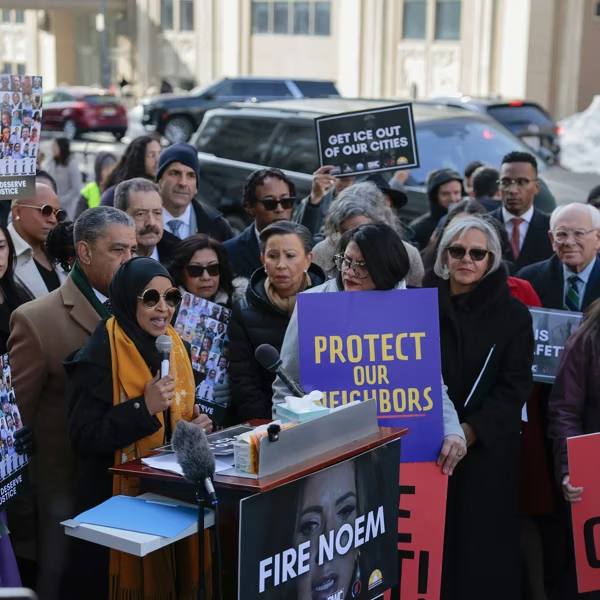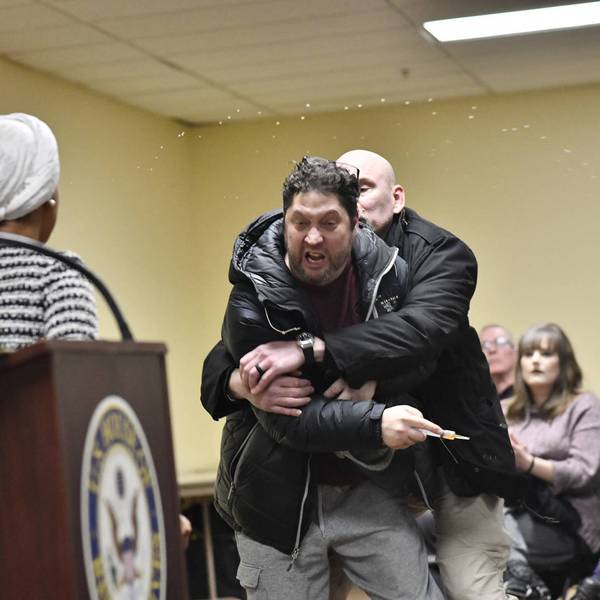President Donald Trump's Friday announcement that he was ending Temporary Protected Status for Somali immigrants in Minnesota prompted outrage and fear from Minnesota Somalis and their allies over the weekend.
In a Truth Social Post, Trump said that he was terminating the TPS program for Somalis in Minnesota "effective immediately," citing concerns about money laundering and gang activity.
“We are deeply disappointed that the administration has chosen to end the Somali TPS program in Minnesota, a legal lifeline for families who have built their lives here for decades," Jaylani Hussein, executive director of the Council on American-Islamic Relations-Minnesota, said in response. "This decision, fueled by harmful misinformation campaigns that we believe have external political motives, will tear families apart and send individuals to a country they have not known for over 20 years."
"This is not just a bureaucratic change; it is a political attack on the Somali and Muslim community driven by Islamophobic and hateful rhetoric. We strongly urge President Trump to reverse this misguided decision," Hussein continued.
"In a typical move, Donald Trump attacks our Somali community because he can’t think of anything else to do on a Friday night."
Minnesota has the nation's largest Somali population at over 26,000. Many have become citizens or are permanent residents, and only around 430 are in the Minnesota TPS program. Further, immigration law experts say that it would be difficult legally to revoke protections before they are already set to expire in March of next year.
"There is literally no legal means by which he can do this. It’s not a presidential power," wrote Aaron Reichlin-Melnick, a senior fellow with the American Immigration Council advocacy group, on social media. "TPS by law cannot be terminated early. Somali TPS is not set to expire until March 17, 2026."
He added that while the Department of Homeland Security "may make an attempt to do this... it would be immediately struck down."
Further, TPS would have to be revoked nationally, and not for a single state.
“There’s no legal mechanism that allows the president to terminate protected status for a particular community or state that he has beef with,” Heidi Altman, policy director at the National Immigrant Justice Center, told the Associated Press.
“This is Trump doing what he always does: demagoguing immigrants without justification or evidence and using that demagoguery in an attempt to take away important life-saving protections,” she said.
Despite this, the remarks sent many in the community into a "panic," local immigration attorney Abdiqani Jabane told the Minnesota Star Tribune.
People “are afraid that ICE [Immigration and Customs Enforcement] agents may start rounding up Somalis. These are people who have lived and worked in the community for more than 20 years," Jabane said.
Somalis were first granted TPS status in the US in 1991 when civil war broke out following the removal of leader Said Barre. Since then, it has been renewed 27 times. Today, the militant group al-Shabab still controls parts of the country.
“Sending anyone back to Somalia today is unsafe because al-Shabab remains active, terrorist attacks continue, and the [Somali] government today is unable to protect anyone,” Jabane said.
Minnesota leaders took to social media to speak out against Trump's edict and stand up for the state's Somali community.
"It’s not surprising that the President has chosen to broadly target an entire community. This is what he does to change the subject, wrote Minnesota Gov. Tim Walz.
Sen. Tina Smith (D-Minn.) wrote: "In a typical move, Donald Trump attacks our Somali community because he can’t think of anything else to do on a Friday night. That’s who he is, but it’s not who we are."
Rep. Ilhan Omar (D-Minn.), who is Somali herself, pushed back against people who used Trump's announcement to call for her deportation.
"I am a citizen and so are [a] majority of Somalis in America. Good luck celebrating a policy change that really doesn’t have much impact on the Somalis you love to hate. We are here to stay," she wrote.




![People gathered for a traditional Somali wedding in the banquet room at the Safari Restaurant and Banquet Center at 4th Ave. and Lake Street, Minneapolis, Friday afternoon, July 29th, 2011.] Bruce Bisping/Star Tribune.](https://www.commondreams.org/media-library/people-gathered-for-a-traditional-somali-wedding-in-the-banquet-room-at-the-safari-restaurant-and-banquet-center-at-4th-ave-and.jpg?id=62230790&width=1200&height=400&quality=70&coordinates=0%2C1215%2C0%2C225)